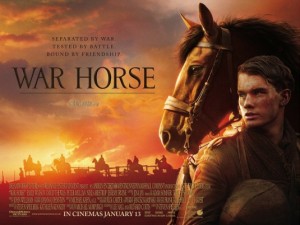The War Horse
Posted on December 23, 2011 at 12:30 pm
 The second Steven Spielberg movie of the week opens on Christmas Day, a grand epic, is big, long, ambitious, and showy. It is a work by a master, but it is not a masterpiece. Every detail is carefully considered. Every leaf on every tree is perfectly aligned so that every sunbeam and shadow fall perfectly across them. Every equine muscle, every country cottage, every blade of grass, every puff of smoke from a discharged weapon is exquisitely framed and lit, but the visuals outweigh the story. The result is serviceable but stodgy, stuffy, and static. The poetry and symbolism of the stage play (with a multi-operator puppet as Joey) is replaced by postcard-picturesque images that are visually rapturous but feel thin in comparison to the movie’s aspirations.
The second Steven Spielberg movie of the week opens on Christmas Day, a grand epic, is big, long, ambitious, and showy. It is a work by a master, but it is not a masterpiece. Every detail is carefully considered. Every leaf on every tree is perfectly aligned so that every sunbeam and shadow fall perfectly across them. Every equine muscle, every country cottage, every blade of grass, every puff of smoke from a discharged weapon is exquisitely framed and lit, but the visuals outweigh the story. The result is serviceable but stodgy, stuffy, and static. The poetry and symbolism of the stage play (with a multi-operator puppet as Joey) is replaced by postcard-picturesque images that are visually rapturous but feel thin in comparison to the movie’s aspirations.
It’s “Black Beauty Goes to War,” the story of a magnificent horse named Joey and Albert (a dull Jeremy Irvine), the boy who loves him. When World War I begins, Albert’s father sells Joey to a gallant young officer (Tom Hiddleston), who promises Albert he will do everything he can to keep Joey safe and get him back home after the war. But war has a way of changing everyone’s plans and soon Joey is on his own journey that will take him back and forth between the British and the German forces and, for a short idyllic time, a respite with a frail but brave little French girl and her affectionate Grandfather. The horse can switch sides in a way that a human cannot, and the movie makes clear the difference between the soldiers who are taken prisoner and shot and the animals who are inherently neutral and thus commoditized. The brutality of war affects the human characters differently as we see in their responses to the animal.
The sweep and grandeur and tragedy of the film pay homage to majestic WWII-era filmmakers like John Ford, with gorgeous cinematography by Janusz Kaminski. One quiet scene of breathtaking power recalling the real-life Christmas truce reminds us of our better angels. But it also reminds us of Spielberg’s better films.
Parents should know that this film has WWI-era peril and violence, some graphic and disturbing, with human and equine characters injured and killed. Characters drink and get drunk.
Family discussion: How did different characters reveal themselves in the way they responded to Joey? What does the barbed wire scene show us?
If you like this, try: “Black Beauty” and “The Black Stallion” and book by Michael Morpurgo

This movie is a grueling punishment. The subject is anguish,not triumph, not horses. It was like watching a terrible beating in beautifully-lit slow motion. I can’t think of a single person -child, woman or man- I’ve ever known that would be glad they had seen this film.